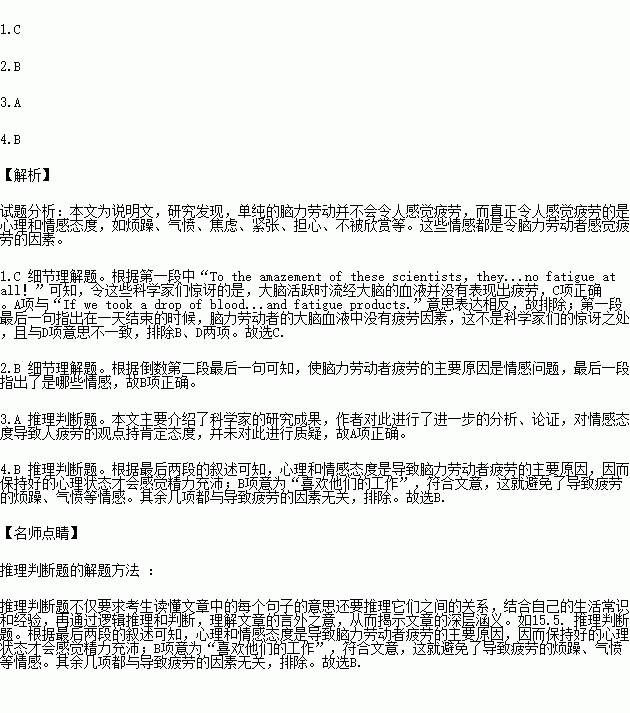题目内容
Here is an astonishing and significant fact: Mental work alone can’t make us tire. It sounds absurd. But a years ago, scientists tried to find out how long the human brain could labor without reaching a stage of fatigue (疲劳). To the amazement of these scientists, they discovered that blood passing through the brain, when it is active, shows no fatigue at all! If we took a drop of blood from a day laborer, we would find it full of fatigue toxins(毒素) and fatigue products. But if we took blood from the brain of an Albert Einstein, it would show no fatigue toxins at the end of the day.
So far as the brain is concerned, it can work as well and swiftly at the end of eight or even twelve hours of effort as at the beginning. The brain is totally tireless. So what makes us tired? Some scientists declare that most of our fatigue comes from our mental and emotional(情绪的) attitudes. One of England’s most outstanding scientists, J.A. Hadfield, says, “The greater part of the fatigue from which we suffer is of mental origin. In fact, fatigue of purely physical origin is rare.” Dr. Brill, a famous American scientist, goes even further. He declares, “One hundred percent of the fatigue of sitting worker in good health is due to emotional problems.”
What kinds of emotions make sitting workers tired? Joy? Satisfaction? No! A feeling of being bored, anger, anxiety, tenseness, worry, a feeling of not being appreciated---those are the emotions that tire sitting workers. Hard work by itself seldom causes fatigue. We get tired because our emotions produce nervousness in the body.
1. What surprised the scientists a few years ago?
A. Fatigue toxins could hardly be found in a laborer’s blood.
B. Albert Einstein didn’t feel worn after a day’s work.
C. The brain could work for many hours without fatigue.
D. A mental worker’s blood was filled with fatigue toxins.
2.According to the author, which of the following can make sitting workers tired?
A. Challenging mental work. B. Unpleasant emotions.
C. Endless tasks. D. Physical labor
3.What’s the author’s attitude towards the scientists’ idea?
A. He agrees with them.
B. He doubts them.
C. He argues against them.
D. He hesitates to accept them.
4.We can infer from the passage that in order to stay energetic, sitting workers need to ________.
A. have some good food.
B. enjoy their work
C. exercise regularly
D. discover fatigue toxins
 培优好卷单元加期末卷系列答案
培优好卷单元加期末卷系列答案
